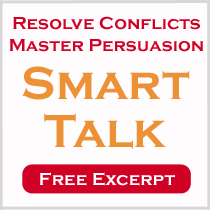How to Make An Argument Stronger
Using Analogies Make Arguments Intuitive
What was most effective was the comparison Jason made between work and sleep. Using that analogy he suggests that like sleep, we need long stretches of uninterrupted time in order to progress into the deepest and most productive work “stages.” He argues that you can’t get a good night’s sleep if you are constantly interrupted. He makes the argument intuitive.
Arguments Require Both “Heart and Head” Evidence
However, if I were to give Jason feedback, I’d focus on the development of his argument. Although he explains his idea via the sleep analogy, he didn’t provided strong enough support for his main argument. When making a main argument, you need to supply multiple forms (heart/intuitive and head/logical) of evidence. Particularly with a generation of multi-taskers sitting in his audience, I think he needed to additionally supply concrete “head” evidence from the field of attention management showing the real cost of interruptions (for example, I read a study that said 2.1 hours of productivity are lost per knowledge worker per day to unimportant interruptions, distractions, and the recovery time from interruptions. I’ve also read that a worker’s effective IQ decreases by 10 points if they are distracted by other tasks. The point is, for me, he didn’t sufficiently argue the reality, the significance, and the magnitude of the problem. His primary argument wasn’t strong enough.
Addressing Counter Arguments Make Persuasion Stronger
In addition, when making an argument, research suggests that to be the most persuasive it is important to also address objections. For example, someone might think, “Well, don’t some interruptions benefit the interruptee and the corporation by providing focus on more important work?” or “Aren’t interruptions at work really just collaboration?” He didn’t address any possible counter arguments in his talk, which again, weakened the overall talk. Finally, his motives for choosing this topic seemed unclear which also weakened his argument.
Strong Openings Are Critical To Gain Attention
From a delivery perspective, he did not have an opening attention getter for this talk. He could have started by asking, “Have you ever posted a do not disturb sign at work?” or “Have you ever left the office to get work done?” …”You’re not alone. It’s estimated that $588 billion is lost annually to unnecessary interruptions. ” Instead, he started with a statement of his thesis. Most audience members are not at full attention when the first words are uttered. If your first words are your thesis then it’s likely some of your audience will miss it and be lost.
Movement Must Be Purposeful
Also I would suggest he choose to move purposefully–only transitioning to a new location as he is transitioning his thoughts. He seemed to roam randomly which caused his walking to be distracting.
What do you think about his speech? What did you think about the strength of his argument?











There are 3 comments .